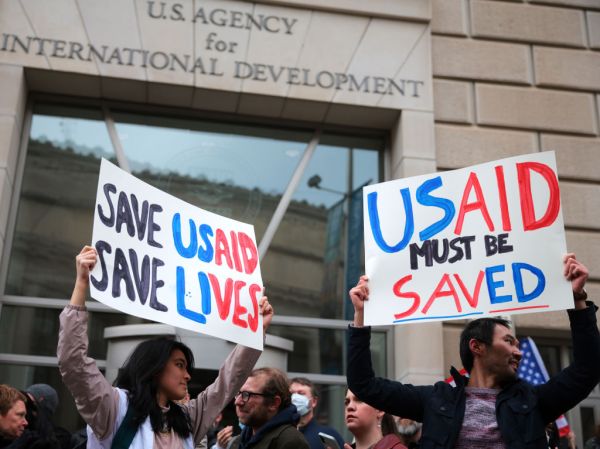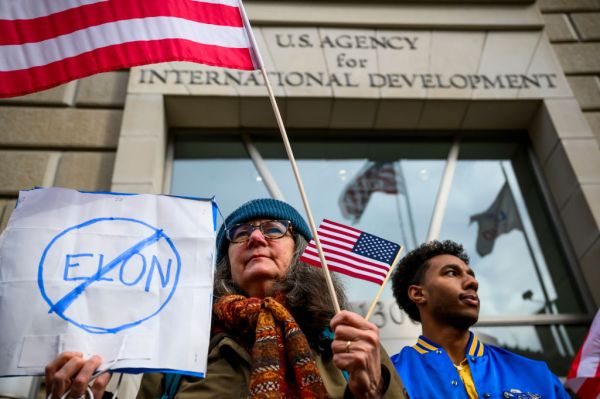Happy Wednesday! Waffle House is renowned for its aversion to closing, including during extreme weather conditions. But even the beloved restaurant chain isn’t impervious to the effects of rising egg prices, announcing this week a 50 cent-per-egg surcharge.
Given the number of eggs your Morning Dispatchers consume on a weekly basis and the occasional necessity of patronizing 24-hour food establishments like Waffle House, we’re considering a poultry surcharge of our own.
(Editor’s Note: No, we’re not.)
Quick Hits: Today’s Top Stories
- President Donald Trump hosted Israeli Prime Minister Benjamin Netanyahu at the White House on Tuesday in his first meeting with a foreign leader since he was sworn in last month. During a joint press conference with Netanyahu, Trump said the U.S. would “take over” the Gaza Strip and indicated plans to clear the enclave of its Palestinian population. “We’ll own it and be responsible for dismantling all of the dangerous unexploded bombs and other weapons on the site,” Trump said. “Level the site and get rid of the destroyed buildings, level it out, create an economic development that will supply unlimited numbers of jobs and housing for the people of the area.”
- President Trump signed an executive order on Tuesday ending U.S. engagement with the United Nations Human Rights Council and halting U.S. funding for the United Nations Relief and Works Agency for Palestine Refugees in the Near East, or UNRWA, an agency accused of employing terrorists and promoting extremism in the West Bank and Gaza. The order also called for a review of U.S. involvement in the U.N. more generally, stating that some of the international organization’s agencies had “drifted” from their mission and “instead act contrary to the interests of the United States while attacking our allies and propagating [antisemitism].” The U.S. is currently the U.N.’s largest contributor, footing the bill for 22 percent of its regular operating budget.
- President Trump signed a presidential memorandum on Tuesday reinstating his “maximum pressure” sanctions regime against Iran. The measures, which target the country’s oil exports, revive a campaign from Trump’s first term aimed at crippling Iran’s economy and forcing it to abandon its pursuit of a nuclear weapon. The move followed a Monday report by the New York Times indicating that U.S. officials believe Iran is developing plans for a cruder, easier-to-produce bomb. Both Trump and Iran’s leaders have signaled their willingness to revive negotiations toward a deal that restricts Tehran’s nuclear program in exchange for sanctions relief.
- A gunman opened fire at an adult education campus near the city of Orebro, Sweden, on Tuesday killing 10 people. Authorities have said the suspected shooter is among the dead and indicated that they don’t believe terror was the motive behind the attack, but have released few additional details. Swedish Prime Minister Ulf Kristersson called the tragedy the worst mass shooting in the country’s history.
- Authorities announced Tuesday they have recovered the remains of all 67 victims who died in last Wednesday’s midair collision of American Airlines Flight 5342 with an Army Blackhawk helicopter in Washington, D.C.—66 of the 67 bodies have been positively identified. The recovery operation, including the removal of the wreckage from the Potomac River, is expected to be finished by February 12. An investigation by the National Transportation Safety Board into the causes of the deadly crash is ongoing.
- The first flight transporting detained migrants to the U.S. naval base in Guantanamo Bay, Cuba, arrived on Tuesday with 10 people onboard. The detainees were suspected members of Tren de Aragua, a notorious Venezuelan gang. The flight followed President Trump’s order last week directing the Pentagon and the Department of Homeland Security to begin constructing a migrant detention center at Guantanamo capable of holding up to 30,000 people. The base currently hosts a small migrant detention facility that can hold up to 120 people.
- FBI agents filed lawsuits on Tuesday seeking court orders to prevent the Justice Department from publicly releasing lists of bureau employees who worked on the January 6 investigation and the investigation into Trump’s handling of classified documents at Mar-a-Lago after the end of his first term. “Plaintiffs reasonably fear that all or parts of this list might be published by allies of President Trump, thus placing themselves and their families in immediate danger of retribution by the now pardoned and at-large Jan 6 convicted felons,” the agents argued in one of the lawsuits. The FBI has reportedly provided the Justice Department with lists containing details about more than 5,000 employees involved in the cases.
- The Senate voted 54-46 Tuesday to confirm Pam Bondi as attorney general, with Democratic Sen. John Fetterman of Pennsylvania joining Republicans in support of her bid. Also on Tuesday, Robert F. Kennedy Jr. and Tulsi Gabbard—President Trump’s picks for health secretary and director of national intelligence—cleared their respective committee votes, sending their nominations to the full Senate for approval.
A Trumpist Takeover

In the wake of Elon Musk’s efforts to access classified Treasury Department information over the weekend, Democratic Sen. Chuck Schumer of New York sounded alarm bells on what he described as the “hostile takeover” of Washington by an “unelected shadow government.”
For Musk—the South African-born tech CEO and newly appointed head of the Department of Government Efficiency, or “DOGE”—the top Senate Democrat’s warning served as proof of concept for his efforts to reshape the federal government. “Hysterical reactions like this is how you know that [DOGE] is doing work that really matters. This is the one shot the American people have to defeat BUREAUcracy, rule of the bureaucrats, and restore DEMOcracy, rule of the people,” he wrote on X Tuesday. “It’s now or never. Your support is crucial to the success of the revolution of the people.”
Less than three weeks into President Donald Trump’s second term, it seems that Musk’s revolutionary zeal has caught on. As the administration moves to kneecap federal agencies and purge personnel, White House officials have been reluctant to let procedure—or likely legal constraints—stand in their way. Meanwhile, a patchwork of federal employees, unions, and advocacy groups have begun to challenge the moves in court.
Elon Musk’s tussle with the Treasury Department over the weekend marked one of the opening salvos in DOGE’s disruption campaign. DOGE employees attempted to access the Bureau of the Fiscal Service, a Treasury unit that distributes payments like Social Security checks and the salaries of federal employees. The move was met by resistance within the department: David Lebryk, the career official who oversaw Treasury payments, abruptly resigned on Friday after refusing to give DOGE representatives access to the payment system.
The problem is that Musk’s employment status is, to say the least, unclear. DOGE is not actually an executive branch department, but a temporary service within the former U.S. Digital Service, now named the U.S. DOGE Service, which is itself a unit within the Executive Office of the President. Oh, and it’s also inexplicably named after an internet meme of a Shiba Inu.
Congressional Democrats quickly pushed back on Musk’s authority. “I am deeply concerned that following the federal grant and loan freeze earlier this week, these officials associated with Musk may have intended to access these payment systems to illegally withhold payments to any number of programs,” Sen. Ron Wyden of Oregon, ranking member of the Senate Finance Committee, said in a Friday statement. “I can think of no good reason why political operators who have demonstrated a blatant disregard for the law would need access to these sensitive, mission-critical systems.”
It was also unclear whether it was even legal for Musk to have access to the system, which contains sensitive information like Social Security numbers. Unions representing federal employees moved quickly to challenge the move in court, filing a lawsuit against the Treasury Department and its head, Scott Bessent, in an effort to prevent the department from sharing the confidential data with DOGE.
Musk has maintained his role as head of various companies—including Tesla, SpaceX, and X—while also leading DOGE, and his security status was uncertain. On Monday, White House press secretary Karoline Leavitt confirmed that Musk was a “special government employee” (SGE), a designation for employees who plan to work for the government for 130 days or less a year.
This status may complicate efforts to shut Musk out entirely. “You may not like it, but you can’t quarrel with the fact that he may have access to some of these records,” Ronald Sanders, a senior fellow at George Washington University’s Center for Excellence in Public Management who previously served as a senior federal executive, told TMD. “At the end of the day, this does close one of the huge gaps in this whole controversy.”
The Treasury Department also emphasized that there would be limits on Musk’s reach. “Treasury has been undergoing a review of these systems to maximize payment integrity for agencies and the public,” Jonathan Blum, a legislative affairs official, wrote in response to queries by members of Congress. “Currently, Treasury staff members working with Tom Krause, a Treasury employee, will have read-only access to the coded data of the Fiscal Service’s payment systems in order to continue this operational efficiency assessment.” He added that Krause, the CEO of Cloud Software Group and a member of the DOGE team, had received a top secret security clearance as an SGE.
At almost the same time as the battle at Treasury was unfolding, administration officials were attempting to make waves at two other governmental institutions: the Department of Justice and its law enforcement agency, the FBI. On Friday, all six of the FBI’s most senior executives and multiple field office chiefs were forced out by Trump administration officials over their involvement in investigating and prosecuting people who committed crimes during the riots at the U.S. Capitol on January 6, 2021.
The letter notifying them of their removal cited Trump’s recent executive order calling the January 6 investigations a “grave national injustice that has been perpetrated upon the American people,” and pardoned or commuted the sentences of the more than 1,500 people convicted of crimes during the riots.
Also on Friday, Emil Bove, the acting deputy attorney general, sent a memo to FBI officials with the subject line “Terminations.” It reportedly gave FBI officials until noon Tuesday to submit the details–obtained by distributing a questionnaire–of thousands of officials who worked on cases related to the January 6 riots. According to reporting by CNN, the ID numbers, job titles, and information about their roles in the January 6 cases for more than 5,000 employees were submitted, over 20 percent of the FBI’s total workforce.
If the Trump administration plans to fire officials who worked on the January 6 cases, however, it might be on shaky legal ground. “I do not think an FBI agent can and should be fired for simply following a lawful order,” said Sanders. “If I were an FBI agent given the notice of removal, I would simply say I was following a lawful order that was entirely within my job description.”
On Tuesday, nine anonymous agents filed a suit in D.C. district court, alleging that the requests by DOJ to distribute the survey were “a form of politically motivated retribution,” citing potential threats to their safety if the information was published, and seeking to stop “the aggregation, storage, reporting, publication or dissemination of any list or compilation of information that would identify FBI agents and other personnel, and tie them directly to Jan. 6 and Mar-a-Lago case activities.”
A second suit filed on Tuesday in the D.C. District Court, by another group of seven anonymous FBI employees, is seeking protection from “from Defendants’ anticipated retaliatory decision to expose their personal information for opprobrium and potential vigilante action by those who they were investigating.”
The lawsuits come after stunning scenes of defiance last week by senior FBI officials resisting the Trump administration’s attempts to gain access to information on January 6 investigations.
On Friday, Acting FBI Director Brian Driscoll refused to provide the names of FBI employees involved in the investigations. After the director reportedly engaged in a heated argument with Justice Department officials that led many in the FBI to believe that he was fired, many agents rallied to him as an unexpected leader. “Today, we find ourselves in the middle of a battle of our own, as good people are being walked out of the FBI and others are being targeted because they did their jobs in accordance with the law and FBI policy,” James Dennehy, the assistant director of the FBI’s New York field office, wrote in an email to staff praising Driscoll. “Time for me to dig in.”
Across the Treasury, FBI, and other U.S. agencies, scores of federal employees and outside legal groups are certainly digging in for a fight. But any decisions by courts on illegal firings, or improper access to confidential records, will take weeks, if not months. The Trump administration may be counting on that.
“They are moving fast to create new facts on the ground,” Bob Bauer, co-author of the Executive Functions blog and former White House counsel to President Barack Obama, told TMD. “By the time these court challenges are resolved, and even when the decisions go against them, they will have radically altered the landscape.” For example, FBI agents who decide to leave for private sector employment instead of facing an investigation or battling for their jobs may never return, even if a court later rules that their firing would have been illegal. A defeat in court, then, could still preserve a policy win for Trump.
But the pushback on the White House’s all-out effort has barely begun. “This moment is the moment where Trump is at his fullest powers,” Anderson said. “Congress isn’t even constituted yet. They’re still working on offices and where people are sitting, they’re barely in a position to organize to do anything.” Lawsuits like the ones filed by the FBI agents are merely the tip of the iceberg. “We’ve seen a slew of litigation this week and last week. That’s the pendulum swinging back,” Anderson predicted.
Never one to be upstaged, the pushback could even come from the president himself. “He’s got access only to letting people go that are not good, if we agree with him, and it’s only if we agree with him,” Trump told reporters on Monday. “Elon can’t do and won’t do anything without our approval.”
Trump’s not-so-subtle warning to Musk is a reminder that with this president, things can change rapidly. “We’re never going to get another chance like this,” Musk wrote on X on Monday. His chance may be over sooner than he expects.
Worth Your Time
- Writing for Foreign Policy, Matthew Kavanagh and Luis Gil Abinader argue that—despite Secretary of State Marco Rubio’s criticisms of USAID for not cooperating closely enough with his department—the agency’s independence is actually an asset when it comes to addressing crises like the Marburg virus outbreak in Tanzania. “A Jan. 27 report from the Africa CDC indicates that there have already been nine deaths from the Marburg outbreak—surpassing the total number of deaths from the last outbreak in Tanzania,” they wrote. “If the virus is not quickly contained, it could develop into a regional epidemic, as occurred in West Africa in 2014 when a small Ebola outbreak spread to more than 13,000 cases in a matter of months. Although they occurred primarily in Guinea, Sierra Leone, and Liberia, infections spread as far afield as the United States and Spain. It took two years and the deployment of the United States military to contain it. But the Tanzanian government has little interest in talking to the U.S. State Department about its outbreaks. … China, not the United States, is the country’s largest trading partner, while India is the largest investor. Tanzania has worked hard to build a middle position between Washington and Beijing, and as such, U.S. diplomats are engaged across multiple strategic areas with the government of Tanzania—from military bases to trade to human rights and democracy. The independence of agencies such as USAID and the CDC allows them to engage differently.”
Presented Without Comment
Associated Press: Cats Won’t Be Banned in Scotland, the Government Confirms
Also Presented Without Comment
Bloomberg: Trump Taps ‘Sharpiegate’ Scientist to Lead U.S. Weather Agency
The Trump administration has tapped Neil Jacobs, a scientist cited for misconduct related to the “Sharpiegate” hurricane forecasting controversy, to lead the agency that oversees U.S. government weather predictions and climate research.
…
As acting administrator of NOAA in 2019, he reprimanded employees for contradicting President Donald Trump’s inaccurate claim that a hurricane would strike Alabama. The agency later said Jacobs’ actions violated its code of ethics.
In the Zeitgeist
The trailer for the new Fantastic Four movie dropped yesterday. The film, which will hit theaters on July 25, brings Marvel’s “First Family” back to its comic book origins and is set in a retro-futuristic 1960s universe.
Toeing the Company Line
- In the newsletters: Nick Catoggio broke down (🔒) how to think about what Elon Musk is up to in the federal government.
- On the podcasts: Jonah Goldberg is joined by Alex Tabarrok on The Remnant to discuss American capitalism, the merits of borders, crypto, and more.
- On the site: David Drucker explains why Trump is still fundraising, Brian Riedl argues Trump is on track to repeat Biden’s economic mistakes, and Jonah unpacks the stock market’s resistance to bullying from the Trump administration.
Let Us Know
Do you agree with Sen. Chuck Schumer’s assessment that Elon Musk is attempting a “hostile takeover” of the federal government?









Please note that we at The Dispatch hold ourselves, our work, and our commenters to a higher standard than other places on the internet. We welcome comments that foster genuine debate or discussion—including comments critical of us or our work—but responses that include ad hominem attacks on fellow Dispatch members or are intended to stoke fear and anger may be moderated.
With your membership, you only have the ability to comment on The Morning Dispatch articles. Consider upgrading to join the conversation everywhere.